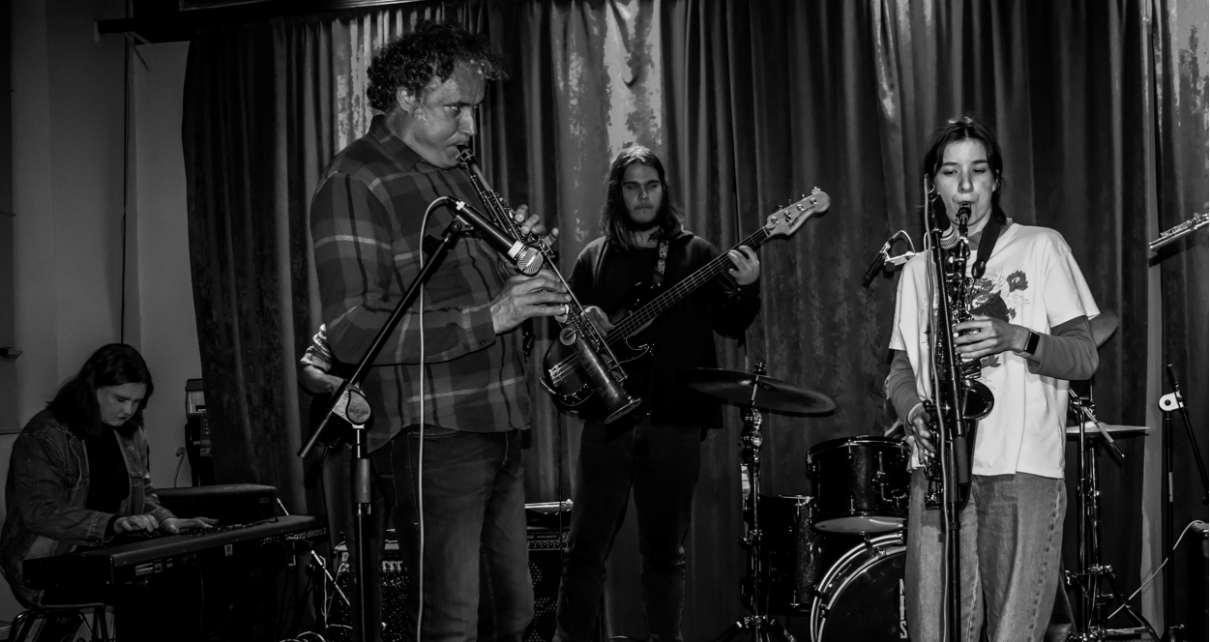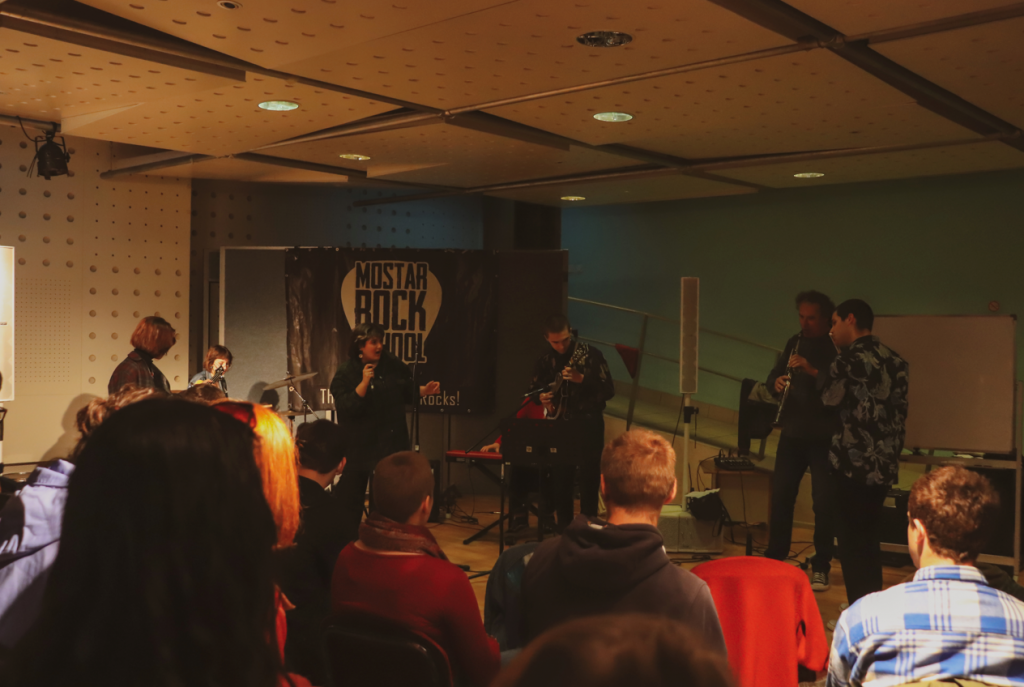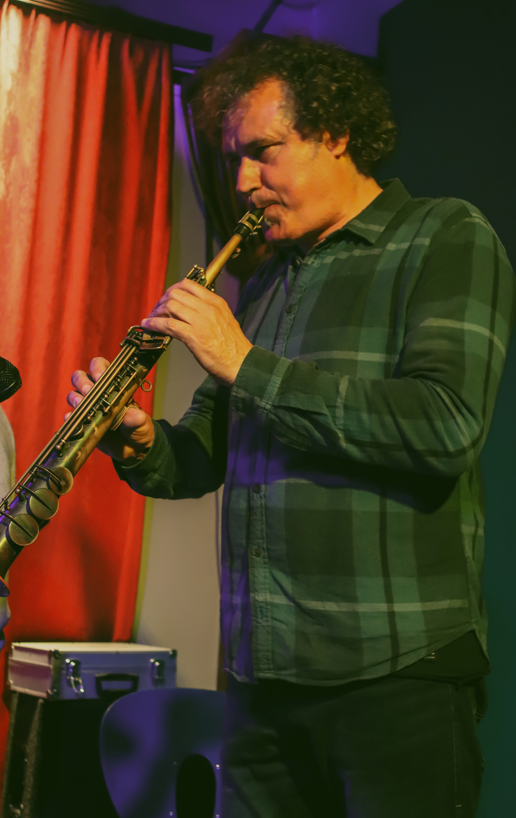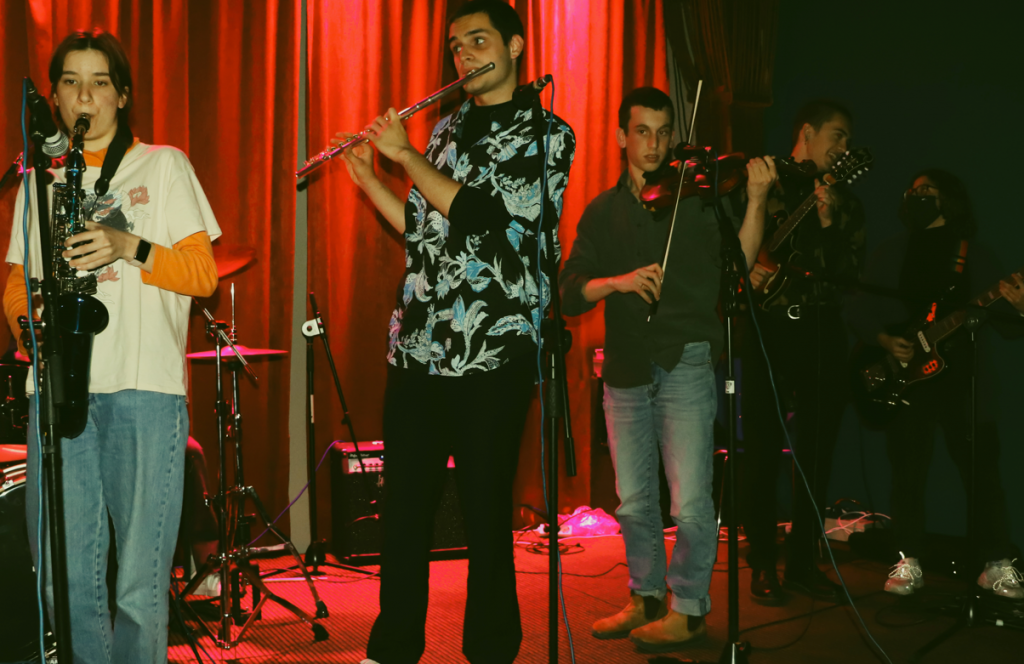
On Tuesday, April 19, 2022, in Studio A of the Pavarotti Music Center, professional jazz musician, saxophonist, flutist, professor, director of Sedajazz Music School, a publishing house and agency from Valencia (Spain), held a one-day educational jazz workshop for Mostar Rock School students and United World College students in Mostar.
Mostar Rock School, during its 10 years of continuous work, strives to provide its students with opportunities to learn and make music with world-renowned musicians, masters of their instrument, those who have theoretical and practical skills in this art; especially those who are willing to selflessly share this knowledge with young people, and who have dedicated their artistic and professional work to it, such as Francisco Angel Blanco Latino.
This Latino’s gift to our students – the jazz workshop – began with a personal presentation – his improvisation on soprano saxophone, after which Latino introduced us to his thirty years-long work with young people in his Sedajazz music school. As Latino says – improvisation, as the main element of jazz music, is an unknown, but also exciting terrain – where you never know what you will come across, and that is the charm of this genre.
After a short introductory part, Latino invited young musicians to join him. It started as a domino effect – one by one; from a flute in a dialogue with soprano saxophone to guitar, bass guitar, vocals, drums, keyboards, mandolin, violins, cello, alto saxophone, joined by even one young guslar, and the audience who rhythmically supported the whole section by clapping. The participants of the workshop created a true Big Band with Latino!
One of the main topics of the workshop was “How to be a good improviser in jazz?”. In the first theoretical part of the six-hour intensive workshop, Latino gave answers to many questions, e.g. How to make interesting melodies, how to practice scales with numbers, and, how to do a “musical dialogue” (group improvisation). He also briefly commented on the history of jazz, its connection with other genres, and its basic musical characteristics. The participants of the workshop also did listening and transposition exercises, as well as exercises of associations in music.
The participants applied their learned knowledge from the workshop by playing the evening concert together with Latino, in the full Klub 27 in the Pavarotti Music Center, in front of a large audience that supported them with thunderous applause! The energy and atmosphere of joint music-making of students from all parts of the world on our small stage were truly memorable.
At the end of the workshop, we spoke with Francisco Angelo Blanco Latino, who sent important messages to the participants of the workshop, as well as to all other young musicians.

How it was for you to work with young musicians, Mostar Rock School students, and UWC students?
I didn’t know the level of playing skills they possess, and I was really surprised to see how high the level was. I was glad to see that they are young musicians with a lot of energy and a desire to learn. It was a wonderful experience for me to work with them. What I can point out is that I have seen that there is room for additional practice and learning improvisation, which is a common occurrence in places where I have held workshops. This is quite normal because jazz is not music that can be heard and learned at every corner, as is often the case for some other genres. What I especially liked was seeing students from different schools united in making music, with the same motivation – making music. I don't know if they have the opportunity to play music together, but I will be happy if they managed to do it this time thanks to my visit and this workshop.
Do you think it’s important for young musicians to study jazz as a genre? Why?
I believe that jazz as a genre, as a musical language, should be mandatory everywhere, i.e. included in the curriculum in all music schools. In modern genres it is necessary and useful to know the language of jazz; in the foreground for practicing creativity and improvisation. What is especially valuable in jazz is its inclusiveness; it can be merged with different music and cultures of the world. That’s how we create fusion genres of flamenco jazz, Hindu jazz, and many others. Jazz is also democratic music – every player can contribute equally. Also, it is not enough just to know how to read the score – it is necessary to learn the art of improvisation.
Do you have any advice on how music schools could contribute to the development of the jazz scene in Mostar and beyond?
In the small place I come from, Sedaví, there was no jazz school. With my initiative, I brought jazz teachers and musicians from other places and other countries to teach and play with local musicians. It’s one of the ways I believe it would contribute to the development of the jazz scene. Also, one way is to organize a Jazz Festival, and invite jazz musicians from other places to perform if there are no available jazz musicians where the festival is organized. If there are no jazz musicians today, it doesn’t mean that they won’t appear tomorrow, because potential future jazzers will have the opportunity to attend concerts that they will like, and that will encourage them to play and study jazz. Finally, the promotion of jazz concerts and educational activities is essential.
What would you say to young musicians who want to play jazz professionally?
The first thing I would tell them is to learn from the recordings. Today we have the internet and there we can hear everything we want, and thus we can play and write down what we hear. It's the best school. Then it is advisable to find musicians who want to play the same music as you, to prepare for enrollment in a jazz school if wanted. To young musicians who want to play jazz professionally, I want to say that it is necessary to find more sources of earning in addition to playing concerts, such as teaching – this is what most jazz musicians in Spain, but also in the world, do.
Do you think Jazz has a future in the modern age among young listeners and musicians? What sets jazz apart from other genres?
I would say the opposite – I think the future is in jazz. Classical music can be composed on the same principles as jazz. E.g. I see some parts of the work of classical music as improvisation, which is essentially a feature of jazz. Therefore, I believe that the future of music is in jazz; jazz is very present. A lot of people don’t even know that they listen to jazz, and that happens all the time. E.g. watching movies with background jazz music. Also, jazz can enrich other genres you love. The only important difference between jazz and other genres is that in jazz you have to learn to compose at the very moment in time, and that’s pretty hard. However, this improvisation can be applied in all other genres, although it can only be learned in jazz. That's the difference. Also, you can use a lot of improvisation in other musical styles when creating melodies, such as popular music, and flamenco music. In these genres, you can find a lot of freedom, as there is in jazz. It is a jazz principle that variations can be made on one melody, and that’s how you create new melodies over and over again. That’s what jazz teaches us.

After the workshop, we talked to the participants who shared their impressions of jazz music and learning with professional jazz musicians such as Latino.
Did you like the Jazz Masterclass with Francisco Latino? What would you point out that you especially liked? – We asked Blaž Čulina.
I really liked the masterclass. Latino surprised me with his knowledge of harmony and theory. He explained these complex things to us in a very simple, interesting, and understandable way.
Do you think that Masterclass workshops like this one are a good thing for young musicians? Why? – Ante Prusina shares his opinion.
Workshops like these are good for gaining a lot of knowledge about jazz, which we don’t often get to learn about with professional jazz musicians like Latino. He has good knowledge and knows how to convey it well. There is no jazz school in our city, so this was a great learning opportunity.
Would you like to have the opportunity to learn more about jazz and attend jazz concerts in Mostar? – Nihad Kurtović answers us.
I would like to. The jazz scene in Mostar is poorly developed, so I would like to have the opportunity to hear new quality sounds in my city. For example, when a jazz musician Vasil Hadžimanov performed in Mostar, in my opinion, it was one of the best concerts. That concert encouraged me to listen, learn and play jazz.
Do you think it is important for young musicians to study and play jazz? What do you think young people, in particular, can learn in jazz that helps them become better musicians? – we asked our student Ema Haznadarević.
Although it is not the genre I like to listen to the most, I think it is important for every young musician to study jazz. This genre has a lot of elements important for playing other genres. For example, one can learn various playing techniques, but also improvisation, creativity, and freedom in making music.

Francisco Ángel Blanco graduated from the Conservatorio Superior de Música de Valencia. He studied jazz at various seminars and Masterclass workshops in Madrid, Valencia, Barcelona, and Portugal with names such as Dave Schnitter, Bobby Watson, Pedro Iturralde, Jerry Bergonzi, Barry Harris, Johnny Griffin, Mike P. Mossman, Perico Sambeat, Frank Tiberi, Greg Hopkins, and many others.
In 1991, he founded the Sedajazz music collective, leading several groups such as the Sedajazz Big Band, the Sedajazz Latin Ensemble, and the Sedajazz Orchestra. He has performed at jazz festivals in Spain, Portugal, Italy, France, Germany, Palestine, South Africa, Mozambique, Mexico…
He has performed and recorded with many world-famous jazz musicians such as Pat Metheny, Miguel “Angá” Díaz, Jordi Rossy, Arturo O'Farril, Kurt Rosenwinkel, Maria Pia de Vito, Bruce Barth, Deborah J. Carter, Marc Nightingale, Ze Eduardo, Chano Dominguez, Horacio “El Negro” Hernandez. He has won numerous prestigious music awards.
He has been teaching youth for 25 years, holding jazz workshops around the world, and collaborating with numerous music schools, conservatories, academies, and bands.

Itís hard to find experienced people about this subject, however, you sound like you know what youíre talking about! Thanks
Thanks for your blog, nice to read. Do not stop.
I was very pleased to uncover this great site. I need to to thank you for ones time due to this fantastic read!! I definitely enjoyed every bit of it and I have you book-marked to see new things in your website.